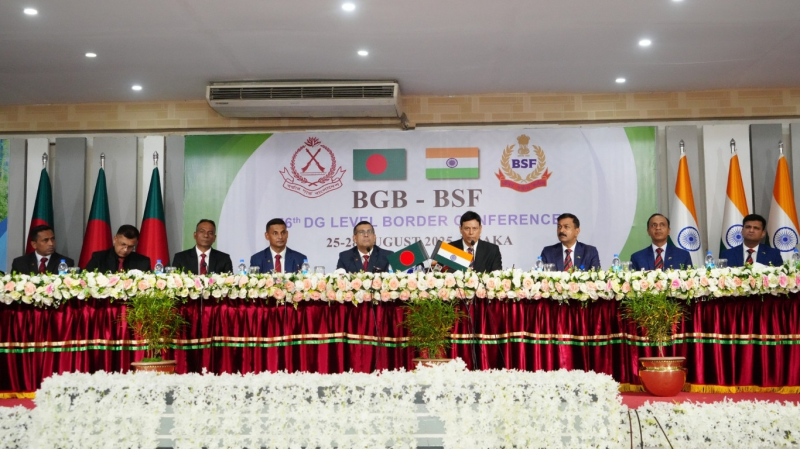- NASA Finds Ammonia Compounds on Jupiter Moon Europa |
- Remittance Inflow Surges 45% to $3.17bn in January |
- Militant Attacks Kill 33 in Balochistan; 92 Assailants Dead |
- Power generation at Payra Thermal Power Plant 1st unit starts after a month |
- Irregularities, injustice will no longer be accepted in politics: Jamaat Ameer |
Bangladesh, India Pledge Zero Tolerance on Border Killings

Photo: BGB
Bangladesh and India have reached an agreement to stop border killings, smuggling, and illegal intrusions, and to ensure repatriation of their nationals through proper legal procedures. Both sides also agreed not to undertake development activities within 150 yards of the zero line.
The agreement was announced on Thursday in a joint statement following the four-day Director General (DG)-level border conference held at the Border Guard Bangladesh (BGB) headquarters in Dhaka.
The Bangladesh delegation was led by BGB Director General Major General Mohammad Ashrafuzzaman Siddiqui, while the Indian delegation was headed by BSF Director General Daljit Singh Chaudhary.
Both chiefs expressed satisfaction with the outcome of the talks and reaffirmed their commitment to work jointly for peace and stability along the border.
During the discussions, the BGB chief voiced concern over indiscriminate shootings of Bangladeshi nationals along the border. In response, the BSF chief pledged to prevent further killings by adopting additional precautionary measures and strengthening night patrols in vulnerable areas.
The two sides agreed to carry out joint awareness programs, promote socio-economic development in border areas, and prevent cross-border movement of criminals, aiming to reduce incidents of violence to zero.
Bangladesh raised the issue of illegal push-ins of Indian nationals and Forcibly Displaced Myanmar Nationals (FDMN). The Indian side assured that Bangladeshi nationals residing illegally in India would be repatriated following due process.
Both countries also agreed to intensify cooperation under the Coordinated Border Management Plan (CBMP) to curb smuggling of narcotics, arms, explosives, gold, fake currency, and other contraband items. They committed to sharing real-time information, investigation findings, and maintaining heightened vigilance.
Further agreements included refraining from airspace violations, coordinating on riverbank protection works, and preventing unauthorized activities in common rivers. On the Connected Bangladesh Project, India assured that relevant agencies would be engaged to expedite installation of optical fiber networks through the Tin Bigha Corridor.
Both delegations reiterated their zero-tolerance stance against insurgent groups and pledged to prevent terrorist activities through real-time information sharing.
Bangladesh also emphasized the need for permanent border pillars in Muhurir Char and resolution of boundary issues along the Ichhamati, Kalindi, Raimangal, and Hariabhanga rivers. India assured it would refer these matters to the appropriate authorities.
Finally, both sides agreed to discourage the spread of misleading or contradictory propaganda that could fuel tensions along the border.

